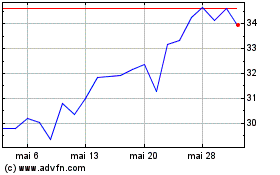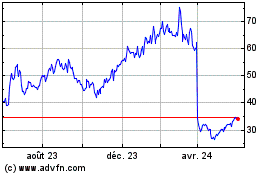Disc Medicine, Inc. (NASDAQ:IRON), a clinical-stage
biopharmaceutical company focused on the discovery, development,
and commercialization of novel treatments for patients suffering
from serious hematologic diseases, today presented positive updated
results from a Phase 1b trial of DISC-0974 in patients with
myelofibrosis (MF) and anemia. The data, presented in an oral
session at the 2024 American Society of Hematology (ASH) annual
meeting in San Diego, CA, demonstrated that treatment with
DISC-0974 results in substantial reductions in hepcidin and
increases in iron levels translating to positive impact on
clinically meaningful measures of anemia across a broad range of
patient types.
“With the presentation of this expanded data set from our phase
1b study, we are encouraged by the continued demonstration of
robust hematologic activity of DISC-0974, including durable
hemoglobin increases in all patient subgroups and meaningful
reductions in transfusion burden. Importantly, we observed strong
responses regardless of patients’ baseline transfusion burden or
concomitant use of JAK inhibitors,” said John Quisel, JD, PhD,
President and Chief Executive Officer of Disc Medicine. “With this
data in hand, I’m pleased to announce that we have now started a
phase 2 trial in myelofibrosis patients with anemia.”
This Phase 1b multi-center, open-label study, enrolled 35 adult
patients with MF and anemia, including patients who were:
non-transfusion dependent receiving no transfusions (nTD, n=23),
transfusion dependent with low transfusion burden (TD Low, n=5) and
transfusion dependent with high transfusion burden (TD High, n=7).
The trial was comprised of both patients receiving concomitant JAK
inhibitor therapy (n=13) and not receiving JAK inhibitor therapy
(n=22). DISC-0974 was administered subcutaneously at 14 mg
(n=1), 28 mg (n=7), 50 mg (n=12), 75 mg (n=9), or 100 mg (n=6)
every 4 weeks for up to 6 treatments. Results demonstrated:
- Consistent, substantial decreases in
hepcidin reaching >75% reduction from baseline and corresponding
increases in serum iron across patients, which translated to
increased levels of reticulocyte hemoglobin and hemoglobin
- 68% of baseline nTD patients achieved a
hemoglobin increase of ≥1.5 g/dL during study period and 50% had
sustained increases for ≥12 weeks
- 100% of TD patients with 1-2
transfusions within a 12-week period at baseline (TD Low) achieved
a ≥50% reduction in transfusion requirement
- 80% of TD Low patients achieved
transfusion independence (TI) over a 16-week period
- 60% of TD patients with 3-12
transfusions within a 12-week period at baseline (TD High) achieved
a ≥50% reduction in transfusion requirement
- 40% of TD High patients achieved
transfusion independence over a 12-week period
- 54% of patients receiving concomitant
JAK inhibitor therapy achieved a major hematologic response
- DISC-0974 was generally well-tolerated
at all evaluated dose levels. Diarrhea was the only adverse event
(AE) that was considered related to DISC-0974 and reported in two
or more subjects. The majority of AEs were not considered related
to DISC-0974.
Management will host a call today, Sunday, December 8 at
9:00pm EST / 6:00pm PST to review highlights of data presented
throughout the meeting and plans for next steps in development.
Please register for the event on the Events and Presentations page
of Disc’s website (https://ir.discmedicine.com/).
About DISC-0974
DISC-0974 is an investigational monoclonal antibody (mAb)
targeting a BMP-signaling co-receptor called hemojuvelin (HJV) and
is designed to suppress hepcidin production and increase serum iron
levels in patients suffering from anemia of inflammation. DISC-0974
was in-licensed by Disc from AbbVie in 2019. Anemia of inflammation
arises from abnormally elevated hepcidin and is the second most
common form of anemia, affecting millions of patients in the US
across numerous diseases such as chronic kidney disease,
myelofibrosis, cancer, autoimmune diseases, and other conditions
with an inflammatory component. Disc has established clinical
proof-of-mechanism of DISC-0974 in a Phase 1 trial of healthy
volunteers, completed a Phase 1b clinical trial in patients with
myelofibrosis and anemia, and initiated a Phase 2 clinical trial of
DISC-0974 in patients with MF anemia, as well as a Phase 1b/2a
clinical trial of DISC-0974 in patients with chronic kidney disease
and anemia who are not receiving dialysis.
DISC-0974 is an investigational agent and is not approved for
use as a therapy in any jurisdiction worldwide.
About Anemia of Myelofibrosis
Myelofibrosis (MF) is a rare, chronic blood cancer that
currently affects an estimated 25,000 patients in the United States
alone. Severe, progressive, and treatment resistant anemia is the
primary clinical manifestation of MF. At diagnosis, over 80% of MF
patients have anemia, which progressively worsens and ultimately
renders the majority of patients dependent on chronic red blood
cell transfusions. Recent studies have shown hepcidin to be a key
molecular driver of anemia in myelofibrosis. Hepcidin is elevated
by approximately 12-fold in MF patients, and is correlated with
disease severity, anemia, and the need for red blood cell
transfusions.
About Disc Medicine
Disc Medicine is a clinical-stage biopharmaceutical company
committed to discovering, developing, and commercializing novel
treatments for patients who suffer from serious hematologic
diseases. We are building a portfolio of innovative, potentially
first-in-class therapeutic candidates that aim to address a wide
spectrum of hematologic diseases by targeting fundamental
biological pathways of red blood cell biology, specifically heme
biosynthesis and iron homeostasis. For more information, please
visit www.discmedicine.com.
Disc Cautionary Statement Regarding Forward-Looking
Statements
This press release contains “forward-looking statements” within
the meaning of the Private Securities Litigation Reform Act of
1995, including, but not limited to, express or implied statements
regarding Disc’s expectations with respect to its phase 1b clinical
study of DISC-0974 in patients with MF and anemia, including the
results thereof. The use of words such as, but not limited to,
“believe,” “expect,” “estimate,” “project,” “intend,” “future,”
“potential,” “continue,” “may,” “might,” “plan,” “will,” “should,”
“seek,” “anticipate,” or “could” or the negative of these terms and
other similar words or expressions that are intended to identify
forward-looking statements. Forward-looking statements are neither
historical facts nor assurances of future performance. Instead,
they are based on Disc’s current beliefs, expectations and
assumptions regarding the future of Disc’s business, future plans
and strategies, clinical results and other future conditions. New
risks and uncertainties may emerge from time to time, and it is not
possible to predict all risks and uncertainties. No representations
or warranties (expressed or implied) are made about the accuracy of
any such forward-looking statements
Disc may not actually achieve the plans, intentions or
expectations disclosed in these forward-looking statements, and
investors should not place undue reliance on these forward-looking
statements. Actual results or events could differ materially from
the plans, intentions and expectations disclosed in the
forward-looking statements as a result of a number of material
risks and uncertainties including but not limited to: the adequacy
of Disc’s capital to support its future operations and its ability
to successfully initiate and complete clinical trials; the nature,
strategy and focus of Disc; the difficulty in predicting the time
and cost of development of Disc’s product candidates; Disc’s plans
to research, develop and commercialize its current and future
product candidates; the timing of initiation of Disc’s planned
preclinical studies and clinical trials; the timing of the
availability of data from Disc’s clinical trials; Disc’s ability to
identify additional product candidates with significant commercial
potential and to expand its pipeline in hematological diseases; the
timing and anticipated results of Disc’s preclinical studies and
clinical trials and the risk that the results of Disc’s preclinical
studies and clinical trials may not be predictive of future results
in connection with future studies or clinical trials and may not
support further development and marketing approval; and the other
risks and uncertainties described in Disc’s filings with the
Securities and Exchange Commission, including in the “Risk Factors”
section of our Annual Report on Form 10-K for the year ended
December 31, 2023, and in subsequent Quarterly Reports on Form
10-Q. Any forward-looking statement speaks only as of the date on
which it was made. None of Disc, nor its affiliates, advisors or
representatives, undertake any obligation to publicly update or
revise any forward-looking statement, whether as result of new
information, future events or otherwise, except as required by
law.
Media Contact
Peg RusconiDeerfield Grouppeg.rusconi@deerfieldgroup.com
Investor Relations Contact
Christina TartagliaPrecision
AQchristina.tartaglia@precisionaq.com
Disc Medicine (NASDAQ:IRON)
Graphique Historique de l'Action
De Nov 2024 à Déc 2024

Disc Medicine (NASDAQ:IRON)
Graphique Historique de l'Action
De Déc 2023 à Déc 2024
